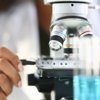Fritextsökning
Artiklar per år
Innehållstyper
-

Läkemedelsföretagens totala pipeline rekordstor – 22 921 läkemedel utvecklas just nu
Bistra ekonomiska tider till trots. Läkemedelsföretagen har aldrig utvecklat så många nya läkemedel som nu.
-

Carl Borrebaeck – professor and serial entrepreneur with a taste for speed
Award-winning cancer researcher, the founder of many listed companies, and constantly in the academic and commercial spotlight for decades. However, Carl Borrebaeck, Professor of Immunotechnology at Lund, is not yet satisfied. “We have a new, potentially super exciting project in the pipeline,” he says.
-

KI’s freezer fiasco investigated: A chain of failures
A chain of combined technical and organisational shortcomings caused the freezer breakdown at the Karolinska Institute during the Christmas holidays, destroying more than 47,000 samples. This was the conclusion of an internal investigation.
-

Nocebo – the evil twin that makes you feel worse
The placebo effect is well known in healthcare, but not so its opposite: nocebo. “The effect is small, but it can have major repercussions,” says Uppsala researcher Charlotte Blease, co-author of a book on the phenomenon.
-

Över 250 sajter stängdes efter försäljning av falska fetmaläkemedel
Över 250 webbsajter stoppades i fjol efter att ha marknadsfört förfalskade versioner av populära diabetes- och fetmaläkemedel av typen GLP-1-analoger.
-

Assignment: Facilitate the retention of foreign researchers
A newly appointed public inquiry is to develop measures to make attracting and retaining foreign doctoral students and researchers in Sweden easier.
-

Ny kurs ska väcka passion för statistik – ”Många får panik”
Kan man förstå och tolka kliniska studier – utan att vara bra på matte? Ja, menar Anna Törner som tillsammans med Ingrid Lönnstedt skapat en onlinekurs för att fler ska våga närma sig statistiska metoder.
-

The life science strategy – what the industry wants
are some of the points that are essential to review.
-

Anna Törner: ”Orphan Designation – the "petite robe noire" of drug development”
It is easy to cling to various regulatory incentives, like orphan designation, and other expedited pathways, without understanding what they truly mean or whether they are indeed right (or wrong) for the current project, Anna Törner writes in a column.
-

Anna Törner: ”Orphan designation läkemedelsutvecklingens ’petite robe noire’”
Det är så lätt att klamra sig fast vid olika regulatoriska incitament, som orphan designation, utan att egentligen veta vad de innebär och på vilket sätt de kan vara rätt (eller fel), skriver Anna Törner i en krönika.
-

Så ser investerarnas önskelista ut
Radiofarmaka, antikroppsläkemedelskonjugat och neurologi. Det är några av de hetaste områdena för investerare inom life science i Sverige just nu.
-

Marie Gårdmark: ”Interchangeable biological medicines – soon in a pharmacy near you?”
”Generic competition is an effective way to push down drug prices, but it has not worked equally well for biosimilars. Biosimilars require more time to gain market share compared to generics, and new biosimilars do not always lead to lower prices” writes Marie Gårdmark in a column.
-

“Don’t postpone the transition to IVDR”
Operators who have not yet started to adapt to the requirements of the new EU IVDR regulation are running out of excuses. This is the opinion of Helena Dzojic, Head of Unit at the Swedish Medical Products Agency, who continues to persistently spread her message: don’t postpone the transition.
-

Första Crispr-terapin nu godkänd i EU
För första gången har en behandling som använder gensaxtekniken Crispr godkänts av EU-kommissionen.
-

Rising interest in CRISPR treatments
Treatments using CRISPR technology are emerging as one of the hottest medical trends in the United States – and the FDA is doing its best to promote the development.
-

Stark uppgång för Crispr-behandlingar
Behandlingar som använder gensaxen Crispr växer fram som en av de hetaste medicinska trenderna i USA – och läkemedelsmyndigheten FDA gör sitt bästa för att stödja den utvecklingen.
-

Ny medicinsk chef på Vicore Pharma
Läkaren Bertil Lindmark blir ny medicinsk chef, Chief Medical Officer, för Vicore Pharma.
-

The Swedish Academy of Sciences: “We have too many researchers”
Sweden does not need more researchers, but it does need better ones. According to the Royal Swedish Academy of Sciences, funding should be distributed to favour excellence.
-

The first drugs to slow down Alzheimer’s – but what does it mean for patients?
New treatments for early Alzheimer’s are bringing hope to thousands of patients and their families. The question is, who will get the treatment, how will the right patients be found in time, and will the healthcare system’s resources be sufficient? Life Science Sweden has spoken to Swedish researchers in Alzheimer’s who voice cautious hope but also see further challenges.
-

Why the world renown researcher Marc Tessier-Lavigne resigns as Stanford´s president
In mid-summer, neuroscientist Marc Tessier-Lavigne announced his resignation as President of Stanford following allegations of manipulated study data. According to the reporter Theo Baker, who first reported the story, Tessier-Lavigne “rewarded the winners and punished the losers”. Here is the background of the story which has shaken the American scientific community over the summer.
-

The Swedish Life Science Office: “We lost in both coordination and manpower”
Since the turn of the year, the Swedish government’s life science office has operated at a lower capacity. Life Science Sweden has spoken to Pontus Holm, Departmental Secretary at the office, about the ongoing work.
-

Samuel Lagercrantz: The government’s performance in healthcare and life sciences so far
Since the change of government in Sweden, developments in the healthcare sector have shown promising signs, but the outlook in life sciences is less promising, writes Samuel Lagercrantz in an editorial.
-

”Jumping genes” öppnar väg för ny behandling mot cancer
Alternativa sätt att hitta tumörantigen på tumörcellens yta kan bidra till att ta fram ny immunterapi.
-

How critical are the “Spermageddon” reports? – Researchers call for action
A much talked about meta-study indicates that sperm concentration in men’s seminal fluid has halved in 40 years. Experts in andrology that Life Science Sweden speaks to believe that the results must be taken seriously, and call for action from the Swedish authorities.